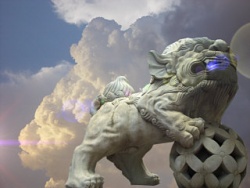Foo Dogs
Foo Dogs are the ancient sacred dogs of Asia who guard Buddhist temples. The association between these dogs and Buddha is one of great significance. Foo Dogs have the appearance of a lion. The lion in Buddhist religion is seen as sacred, and has sometimes been offered to Buddha as a sacrifice. The name given to these guardians originates from China. The Chinese word for Buddha is Fo, which led to the original title– “Dog of Fo”. There have been other theories that the name developed from the city of Foochow; however, there is no actual proof of this. Another name given to the beast is “Lion of Korea”. This, of course, is due to the creatures close appearance to a Lion.
Foo Dogs can be traced as early as the Han Dynasty. Their first appearance was in Chinese art, which dates back to approximately 208 BC to about 221 AD. Foo Dogs vanished for nearly 400 years after their first appearance. They later returned in the T’ang Dynasty that was in power from 618 to 917 AD. Foo Dogs were popular because of their meaning. The Lion is a creature of the feline race that is known as the proud master of all cats. Its introduction into Chinese art coincided with Buddhism. The Foo Dog was the protector of sacred buildings and a defender of law. The dogs were commonly placed at business institutions, temple gates, home entrances, and estates. It was also not uncommon to see these sacred dogs guarding tombs or placed in front of government buildings to scare evil spirits. Through out the ages, Foo Dogs were frequently given as gifts to the Emperor. They would be presented in sculptures or in the form of artwork.
Foo Dog artwork varied. Buddha was sometimes depicted on the back of the great beast, but Foo Dogs are more often displayed in a powerful guarding position. The creature is usually presented holding a spear in its paw. This was the representation of the peace and serenity the animal would maintain for the sanctuary it was guarding; thus discouraging any wrong doers and demon spirits from entering the place of tranquility. The Foo Dog comes in many shapes, sizes, different materials, and colors. Their faces have a mischievous and almost devilish look about them; and their eyes are normally wide open with a tiny speck in the middle. This threatening appearance is what gives the idea that they guard against evil spirits. It is important to point out that the Foo Dog is also known as the Celestial Dog, and the Happiness Dog. The animal is a symbol of energy and value, and is often displayed in a male/female pair. The male plays with a ball that symbolizes the Earth, while the female holds a cub.
The Foo Dog is embodied in rich Chinese history and tradition. They are still very popular today, not only in China, but also in other parts of the world. They are fantastic dogs not only infused with artwork – but with meaning.
